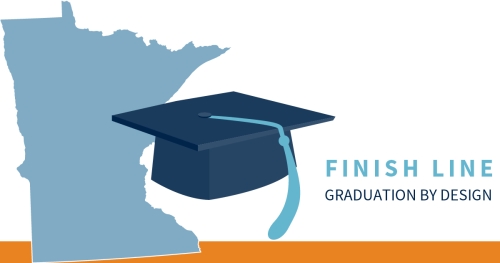The Finish Line: Graduation by Design

Overview
MDRC’s Center for Applied Behavioral Science (CABS) and Postsecondary Education policy area launched The Finish Line: Graduation by Design to improve college completion rates using behavioral insights. Graduating from college is a challenge, particularly for low‐income and nontraditional students, who often face personal, institutional, and structural barriers to success.
The number of credits that students attempt each semester and students’ academic performance are well‐documented predictors of graduation. Yet, most community college students enroll in fewer than 15 credits per semester, making it nearly impossible for them to graduate in two years. Many of these students also struggle academically, failing to make satisfactory academic progress, halting their progress altogether, and losing financial aid. What can be done about these types of challenges?
Behavioral science helps to explain why some of these barriers to graduation are difficult to overcome. For example, a common pattern of students enrolling full time but later switching to part time may be a sign of optimism bias, when people believe that they have a lower risk of experiencing a negative outcome compared with others. While some students may believe they will still be able to earn their degree even after they switch to part‐time status, many are not realistic in assessing this likelihood. Developing interventions based on these types of behavioral insights may generate promising solutions to the stubborn problem of low graduation rates.
Additional Project Details
Agenda, Scope, and Goals
The Finish Line project will use a behavioral diagnosis method, called the CABS Framework, to conduct a systematic analysis of the college experience — identifying contextual factors; institutional structures; staff, administrator, professor, and advisor attitudes; and personal barriers that may prevent students from earning a credential.
The project will focus on detecting key bottlenecks in three domains that research indicates and colleges believe may help students reach their goals:
-
Attempting more credits. A body of higher education research demonstrates that students who enroll full time are more likely to graduate, compared with students who enroll part time. Assuming that getting students to attempt more credits is beneficial, how we can reach this goal? This initiative will aim to increase the number of credits students attempt and earn each semester.
-
Maintaining satisfactory academic progress (SAP). Students who are placed on academic probation face difficulties that reach beyond losing access to financial aid. Being placed on probation can also have a negative psychological impact, creating obstacles that undermine students’ efforts to address their academic challenges. The goal of this initiative is to identify interventions that may help those who are at risk of SAP probation stay in college and ultimately complete their program of study.
- A domain identified through behavioral diagnosis. A central mission of MDRC’s CABS Framework is to learn from and incorporate the perspectives of our partner organizations. Thus, we aim to highlight the colleges’ viewpoints on areas they identify as challenges for students, and to view those challenges through a behavioral lens. In other words, we enter this project open to the idea that an unforeseen third domain will be unearthed through the diagnosis process.
Design, Sites, and Data Sources
Over a two‐year period, MDRC will work to recruit colleges to partner in this initiative, complete a series of quantitative and qualitative analyses to explore barriers to student success ― including using predictive analytics to identify the students who are most at risk ― and propose interventions that address key barriers to college completion.
The Finish Line will develop innovative and untried solutions, build capacity within institutions to diagnose and evaluate their problems, and share behavioral insights and lessons with the broader higher education community.







